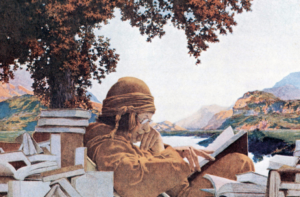Read this site’s featured article.
Hello César,
Hope you are doing well. I’m back in the old country.
It seems you found a perspective-changer in Them and Us. If you deem this work to be important, it is only right that I delve into it too. Anthropology can be quite fascinating, and there’s much to learn in the tens of millennia of our evolutionary history.
Be aware, though, the topic of Neanderthals can be a divisive one. Varg Vikernes, a vehement Nordicist, believes that we actually descend from Neanderthals, not Homo Sapiens.
He believes Neanderthals were a superior race, due to their skull size and body strength; that Sapiens were an African racial inferior who, through the use of civilisation and its technological advantages, defeated and outbred their forest-dwelling, big-brained cousins.
I have a lot of respect for Vikernes, but I think he is biased towards Neanderthals due to his anti-civilisational worldview, which is clouding his judgment.
Here is a link to Varg’s website, where he “debunks” anti-Neanderthalism.
I centre my philosophy on the 4 Words. I believe it took astronomic hatred to birth blue-eyed beauties into this world.
If you wish to post this email as a comment on WDH, go ahead.
Cheers,
Mauricio
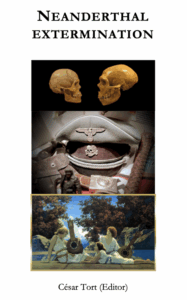 The anthology which includes, in addition to excerpts from Danny Vendramini’s book, 23 posts from this site, revised and edited this month, is now available here. As I have said, I will have to integrate Vendramini’s thesis on the extermination of prehistoric Neanderthals into my worldview.
The anthology which includes, in addition to excerpts from Danny Vendramini’s book, 23 posts from this site, revised and edited this month, is now available here. As I have said, I will have to integrate Vendramini’s thesis on the extermination of prehistoric Neanderthals into my worldview.
Foreword
Hatnote. Below I reproduce the foreword to my new anthology which, although ideally I would have the funds to publish it as a printed book, will only be available as a PDF for the time being.
The foreword includes some passages I quoted on Saturday about a case Jung studied, but what the foreword omits is that most of the new PDF consists of edited content from another PDF, On Exterminationism, which I will delete when the new one is finished and published under another title, Neanderthal Extermination.
As I confessed recently, Vendramini’s book has changed my worldview so much that after finishing reviewing the PDF I will have to write a new featured post, which until now has been the article entitled ‘The Wall’.
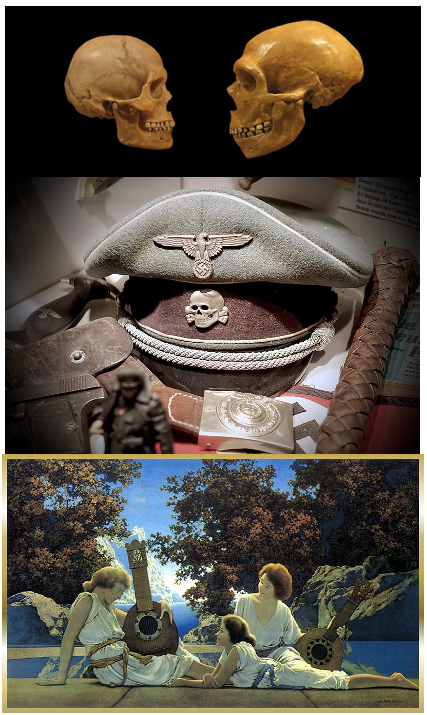
The cover of Neanderthal Extermination.
Foreword
From the mid-1970s onwards, my teenage life was destroyed not only by my parents’ abuse, but also by a psychiatrist they hired to finish me off.
Discovering an area of research that significantly improves my view of the world has only happened to me occasionally. In 1983, for example, I discovered an interview with Theodore Lidz in a bookshop that made me realise that not all psychiatrists were depraved individuals who sided with abusive parents in conflict with their children. When talking about possessive mothers who came to his office and co-dependent fathers who fell into a state of folie à deux with them, Lidz seemed to portray the dynamics of my family as if he had lived with us! And unlike the vast majority of his colleagues, Lidz and other professionals knew that such parents can drive their children mad. My discovery of that book marked the beginning of my familiarisation with the trauma model in the decades that followed. Unlike the pseudo-scientific model of orthodox psychiatrists, I eventually came to understand my parents’ behaviour.
But the damage to my mind due to abuse at home was already done, and I was unable to pursue a career, instead becoming alienated in cults and pseudosciences of the paranormal. The next milestone in my intellectual life came in 1990, when I began reading the sceptics of parapsychology, thanks to the group led by Paul Kurtz whom I had met at the end of the previous year at some lectures they gave in Mexico City. Thanks to their work I realised that parapsychology was also a pseudoscience.
In 2002, I discovered the books of Swiss psychologist Alice Miller: the first writer to take the side of the abused child one hundred per cent, thanks to whom I was able to heal my still wounded heart. But it was not until late 2008 that I discovered, thanks to the internet, that millions of Muslims were migrating to Europe, replacing the native population. I became so obsessed with the subject—which, unlike the others, could only be discussed on the internet—that the following year I came across articles in The Occidental Quarterly Online that revolutionised my worldview. It was only thanks to this latest discovery that I began a career as a blogger with my The West’s Darkest Hour, to which I eventually gave an anti-Christian slant: insofar as ideas about racial egalitarianism and humane universalism have a Christian aetiology, regardless of Jewish subversion in the media.
It was precisely because of this neo-Nietzscheanism that, at Christmas 2018, my next intellectual milestone was to realise that the historicity of Jesus had been seriously questioned. In my spiritual odyssey I owe this new discovery to Richard Carrier’s work on the New Testament. For someone who sixty years earlier had been baptised by the famous Jesuit Joaquín Sáenz y Arriaga, a friend of my very Catholic parents, Carrier’s discovery was a real milestone as the Christian doctrine of eternal damnation had virtually driven me mad in my teens and twenties.
Thus, at the ripe old age of sixty-seven, I never imagined that another author could further improve my worldview. But the miracle happened in August 2025, the month in which I am writing this prologue. I am referring to Danny Vendramini’s Them and Us.
But why was a book that attempts to revolutionise our view of the interaction between Neanderthals and our distant ancestors also a milestone? To answer that, I would have to go back once again to the fateful 1970s. It was in the same decade that my parents murdered my soul that I coined the phrase ‘the extermination of the Neanderthals’. But to understand it, I would have to go back even further, to the 1960s.
As I recount in a passage from my autobiographical trilogy, when I was a small child, going with my family to downtown Mexico City, I was horrified by the people I saw there. Compared to the beautiful Colonia Del Valle where we lived, the city centre was a horrible place, and the people I saw there seemed horrible to my eyes. So much so that years later, when I was eleven, I once told my younger siblings (I am the eldest) that I wanted to machine-gun ’em all.
It was those exterminationist desires that, in the following decade, when my parents began to mistreat me, spawned the tremendous call to exterminate Neanderthals. I cannot pinpoint the exact year when I came up with that phrase, but if we fast forward fifty years later I discovered an eloquent book that talks about how Neanderthals were, in fact, exterminated! Although a few years earlier I had heard, albeit only in passing, that Cro-Magnons had eliminated the Neanderthals, Vendramini’s book paints a picture of Cro-Magnons in such a way that their psychology seemed like a super-accurate X-ray of my old exterminationist passion.
The point is that in the 1970s I had never heard that Cro-Magnons had exterminated Neanderthals, nor in the 1980s, 1990s or the first decade of the new century. If Vendramini and others are right, how could I have sensed it? Yes: it could have been a mere coincidence. Another possibility is that Carl Jung is right. In Man and His Symbols, he said:
The archetype in dream symbolism
By “history” I do not mean the fact that the mind builds itself up by conscious reference to the past through language and other cultural traditions. I am referring to the biological, prehistoric, and unconscious development of the mind in archaic man, whose psyche was still close to that of the animal… My views about the “archaic remnants,” which I call “archetypes” or “primordial images,” have been constantly criticized by people who lack a sufficient knowledge of the psychology of dreams and of mythology.
The Swiss psychologist illustrated this with a case that impressed me:
A very important case came to me from a man who was himself a psychiatrist. One day he brought me a handwritten booklet he had received as a Christmas present from his 10-year-old daughter. It contained a whole series of dreams she had had when she was eight. They made up the weirdest series of dreams that I have ever seen, and I could well understand why the father was more than just puzzled by them. Though childlike, they were uncanny, and they contained images whose origin was wholly incomprehensible to the father. Here are the relevant motifs from the dreams.
I’ll just mention a couple of them, and Jung’s brief interpretation that describes what we call the collective unconscious:
A drop of water is seen, as it appears when looked at through a microscope. The girl sees that the drop is full of tree branches. This portrays the origin of the world.
A small mouse is penetrated by worms, snakes, fishes, and human beings. Thus the mouse becomes human. This portrays the four stages of the origin of mankind…
Precisely a mouse-like creature that survived the asteroid that killed the dinosaurs was our remote ancestor. Unfortunately, something happened to the little girl:
The father was convinced that the dreams were authentic, and I have no reason to doubt it. I knew the little girl myself, but this was before she gave her dreams to her father, so that I had no chance to ask her about them. She lived abroad and died of an infectious disease about a year after that Christmas.
If the Cro-Magnons wiped out the Neanderthals—in addition to Vendramini, this is a common opinion among many other scholars—the study of archaic remnants could shed light on my desire to ‘exterminate the Neanderthals’; and why it took hold of my psyche, from my adolescence, until it became a true personal religion. Although in his book Vendramini mentions Jung’s collective unconscious in passing, he attempted to give it a scientific basis with the theory of teems: that archaic remnants or primordial images could be hidden in our ancestral DNA. The big question is, could the genocidal passion that sprang from the depths of my being have been unleashed when I found myself in an extreme situation?
As for why Vendramini’s work has not been addressed in academia, it has to do with the fact that the Establishment is composed of those I call hyper-Christian atheists, in the sense that they have taken not only racial egalitarianism and catholic universalism as dogma, but also love for all wingless bipeds as the new faith of secular man. This axiological phenomenon, which is nothing more than folie en masse, began with the fateful defeat of Adolf Hitler’s Germany in 1945. The post-1945 System simply ignores any data that might inspire whites to ethnically cleanse the West of non-white invaders. For example, the neochristians who have uploaded videos purporting to refute Vendramini have resorted to gross distortions, straw men and even lies. As I said at the end of my article ‘Youtubers’: ‘Only when academia returns to the hands of scholars who don’t hate the white man—and that would only happen after a revolution—can Vendramini’s work be valued on its own merits’ [footnote].
______ 卐 ______
This book is composed of three sections. The first section quotes key passages from Vendramini’s book.
The second section collects entries from my blog, including repeated quotes from William Pierce’s The Turner Diaries, culminating in my brief exterminationist manifesto.
The third section complements the embryonic precepts of my new religion with more edited entries from The West’s Darkest Hour, and the appendix demonstrates that the ancient Indo-Aryans would share this exterminationist passion when the dark age arrived.
César Tort
27 August 2025
YouTubers
Yesterday I watched the critics on YouTube of what Danny Vendramini says in Them and Us: How Neanderthal Predation Created Modern Humans. I don’t know if Vendramini still lives in Australia (his website is defunct). At any event, it’s very easy to debunk these “debunkers”.
One of them tried to refute Vendramini’s claim that Neanderthals had fur by arguing that fur can fossilize, and the Neanderthal remains found do not show fossilized fur. What the YouTuber omitted is that this, fossilized fur, rarely happens, so only if the remains of a mummified Neanderthal were ever discovered would we know who is right: the orthodox view of the Neanderthal as furless, or Vendramini.
More than one YouTuber claimed that Vendramini’s statement that Neanderthals evolved in Ice Age Europe was false and that the climate then was similar to that of Europe today.
These “debunkers” haven’t even read the Wikipedia page on Neanderthals and other hominids, which tells us that the origin of Neanderthals dates back to the Mindel Ice Age (between 400,000 and 350,000 years ago), during which climate change and the rise of the Arctic ice cap apparently forced European populations of H. heidelbergensis to seek refuge from the cold on the continent’s southern peninsulas. These migrations isolated H. heidelbergensis populations, inducing a population bottleneck and favouring speciation. By the end of the Ice Age, heidelbergensis populations had already begun to acquire Neanderthal traits. Finally, between 230,000 and 200,000 years ago, H. heidelbergensis had acquired enough physical range to be differentiated into a new species, Homo neanderthalensis.
A YouTuber misrepresented Vendramini by omitting that his bottle-neck theory only referred to our Skhul-Qafzehs ancestors of the Levant, not to other hominids in other parts of the globe (insofar as the latter didn’t clash with the Neanderthals). Another YouTuber misrepresented what Vendramini said, that Neanderthals belonged to the group of primates, as if implying that Vendramini was unaware that Homo sapiens was also a primate—a clear straw man since Vendramini never implied that! He also said that Neanderthals and early humans probably became best friends, good neighbours. I could mention other wishful thinking arguments, strawmen and misrepresentations from YouTubers but I will limit myself to saying that the final straw came when these “debunkers” showed Neanderthal and human skulls side by side on their own cameras.
Anyone not infected with the kind of egalitarianism that wants to make us see niggers as brethren will see with his own eyes the enormous differences between the two skulls. I couldn’t believe what I was watching in the “debunkers'” videos…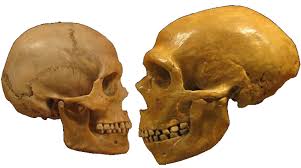 For example, although the visual impact is that we are looking at another species, one that looks more like an evolutionised ape (see the protuberances above the eye sockets and the great occipital elongation), these YouTubers were claiming, by posting images like the one above in their own videos, that Neanderthals were humans like us! Of course, not a word came from the lips of these “debunkers” about the fact that Neanderthals had eye sockets much higher than ours.
For example, although the visual impact is that we are looking at another species, one that looks more like an evolutionised ape (see the protuberances above the eye sockets and the great occipital elongation), these YouTubers were claiming, by posting images like the one above in their own videos, that Neanderthals were humans like us! Of course, not a word came from the lips of these “debunkers” about the fact that Neanderthals had eye sockets much higher than ours. The “debunkers” also didn’t say a peep regarding another of Vendramini’s observations: that Neanderthals had larger eyes than ours.
The “debunkers” also didn’t say a peep regarding another of Vendramini’s observations: that Neanderthals had larger eyes than ours. To grotesquely insult our intelligence, one of the main “debunkers” included this image of… a purported Neanderthal girl several times throughout his video!
To grotesquely insult our intelligence, one of the main “debunkers” included this image of… a purported Neanderthal girl several times throughout his video!
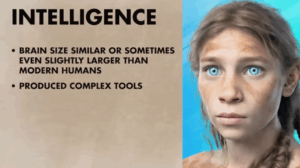 Another of the “debunkers” had no choice but to acknowledge that throughout Europe multiple caves have been found whose remains prove that Neanderthals were cannibals. But he was quick to exonerate them by claiming that Homo sapiens had also eaten human flesh. This reminded me once again of how anthropologists, so imbued with the precept of loving one’s neighbour, write about the “noble savage” while idealising infanticidal cultures (see the delirious cases I compiled on this subject in my Day of Wrath).
Another of the “debunkers” had no choice but to acknowledge that throughout Europe multiple caves have been found whose remains prove that Neanderthals were cannibals. But he was quick to exonerate them by claiming that Homo sapiens had also eaten human flesh. This reminded me once again of how anthropologists, so imbued with the precept of loving one’s neighbour, write about the “noble savage” while idealising infanticidal cultures (see the delirious cases I compiled on this subject in my Day of Wrath).
Many other things the “debunkers” alluded to in their videos, such as whether Neanderthals could sew or use flowers at their funerals, can be answered simply by reading the Wikipedia page on Neanderthals—taking into account that Wikipedia is aligned with these YouTubers’ anti-white agenda. A calm reading of that Wikipedia article puts in its place the exaggerations the YouTubers had to resort to in their eagerness to dismiss Vendramini’s Neanderthal Predation theory.
Forget the YouTubers. They’re white trash. Only when academia returns to the hands of scholars who don’t hate the white man (and that would only happen after a revolution) can Vendramini’s work be valued on its own merits.
For the moment, that’s impossible.
I’d like to comment on something I consider important. Although the Neanderthal became extinct thousands of years ago, long before the first civilisations, the myths about yetis, the abominable snowmen and sasquatch have a profound explanation. In Man and His Symbols, Carl Jung said:
The archetype in dream symbolism
By “history” I do not mean the fact that the mind builds itself up by conscious reference to the past through language and other cultural traditions. I am referring to the biological, prehistoric, and unconscious development of the mind in archaic man, whose psyche was still close to that of the animal… My views about the “archaic remnants,” which I call “archetypes” or “primordial images,” have been constantly criticized by people who lack a sufficient knowledge of the psychology of dreams and of mythology. [page 67]
The Swiss psychologist illustrated this with a case that impressed me:
A very important case came to me from a man who was himself a psychiatrist. One day he brought me a handwritten booklet he had received as a Christmas present from his 10-year-old daughter. It contained a whole series of dreams she had had when she was eight. They made up the weirdest series of dreams that I have ever seen, and I could well understand why the father was more than just puzzled by them. Though childlike, they were uncanny, and they contained images whose origin was wholly incomprehensible to the father. Here are the relevant motifs from the dreams. [page 69]
I’ll just mention a couple of dreams, and Jung’s brief interpretation that describes what we call “the collective unconscious”:
A drop of water is seen, as it appears when looked at through a microscope. The girl sees that the drop is full of tree branches. This portrays the origin of the world.
A small mouse is penetrated by worms, snakes, fishes, and human beings. Thus the mouse becomes human. This portrays the four stages of the origin of mankind…
Precisely a little mouse-like creature that survived the asteroid that killed the dinosaurs was our remote ancestor! Unfortunately, something happened to the little girl:
The father was convinced that the dreams were authentic, and I have no reason to doubt it. I knew the little girl myself, but this was before she gave her dreams to her father, so that I had no chance to ask her about them. She lived abroad and died of an infectious disease about a year after that Christmas. [page 70]
In my humble opinion, this can help to understand the myths about yetis and the abominable snowmen…
Wrong look
I just realised that I made a mistake at the beginning of the “Neanderthal Extermination” series by omitting the reasons why prehistoric Neanderthals didn’t look like what museums, collection books and TV documentaries show us. This video by Danny Vendramini himself corrects that mistake.
Neanderthal
extermination, 12
Editor’s note:
The modern man’s body beautification didn’t end with Cro-Magnon: it is a task that continued throughout later prehistory. In some passages from the final chapters of Them and Us, we read:
______ 卐 ______
The journal, Evolution and Human Behavior recently published a study by Canadian anthropologist Peter Frost, which claimed the genetic mutation in the hair colour gene that resulted in blonde hair occurred about 11,000 years ago and quickly spread through sexual selection. Researchers at Copenhagen University have identified the single point mutation in the OCA2 gene that is responsible for all the blue-eyed people alive today. They calculated the mutation happened between 6,000 and 10,000 years ago in Europe.
This genetic data supports NP theory’s argument that by 10,000 years ago, artificial selection and sexual selection of the nascent human phenotype was in full swing. […]
For example, so thoroughly had the genes for hairiness been expunged, rendered inoperative (turned into what are called pseudogenes) or silenced (which means they are no longer expressed) that today, anyone born with full body hair is considered a medical curiosity. Since records began in the Middle Ages, only about 34 cases of the condition, called congenital generalised hypertrichosis, have been described in the medical literature.
Because of its importance in differentiating the warring species, the Cro-Magnon human face received the full makeover. Faces became more symmetrical. Skin became wrinkle-free, clear and unblemished. The eye whites really were white, the lips fuller and the nose (petite by primate standards) protruded conspicuously from the face. Gone were the two forward-projecting gaping nostrils of the primate nose. Gone was the leathery skin. And gone too was the coating of protective body hair, even in hot tropical regions. Beauty became the prevailing guide to mate selection, and meant the opposite of what Neanderthals looked like.
Further accentuating the divide were mutational alleles for novel hair and eye colours. Amongst some Northern European groups the new lighter colours became highly-prized. From a distance nothing stamped a person one of us better than blue eyes and a coiffure of blonde, brunette or red hair, especially if it was well-groomed and decorated—something the others never did.
The 35,000-year-long process of genetic pruning was so comprehensive that it rendered Cro-Magnons almost unrecognisable from their former selves. They were now much smarter, more artistic, more creative… more human. Behaviourally though, it was a different story. There was still one step to go—one final transition before you’d let one of these Neolithic men date your daughter or sit down with you to discuss the economic meltdown over a decaf cappuccino. The last challenge was to curb—or at least control— hyper-aggression in young males. […]
Let ’s be logical about this
Hyper-aggression is derived from the emotional centres of the ‘reptilian brain.’ This means that Cro-Magnon fixed action patterns would have been inflexible, emotional responses. The non-cognitive nature of these behavioural responses is reflected today in psychological attitudes like racism, colourism, xenophobia, ethnocentrism, chauvinism, pack rape mentality, vigilantism, hooliganism and vandalism. For the most part, these are not specific behaviours. They are emotional states and psychological mindsets that, under certain circumstances, may predispose violent behaviour such as lynching, gang rapes and ethnic cleansing. Once they are triggered, these behaviours are normally resistant to cognitive constraint. […]
But despite the glacially slow progress, by 1790 the Declaration of the Rights of Man of the French Revolution was empowered in a genuine attempt to curb the devastation of barbarism, anarchy and mob rule.
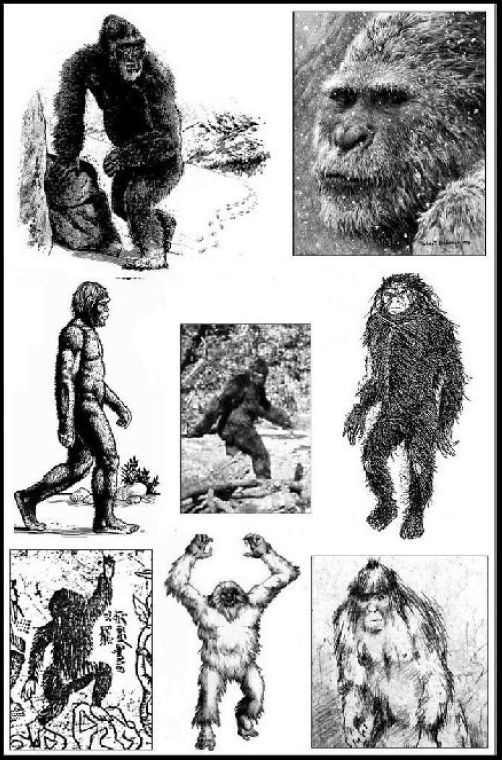
A motley collection of yetis, abominable snowmen and sasquatch from popular culture and mythology, all bear a striking similarity to Neanderthal physical characteristics.
The theory argues that all the great empires of antiquity—Phoenician, Persian, Greek, Roman, Mongol, Egyptian, Byzantine, Mogul and Aztec—engaged in expansionist re-enactments of the first great conquistadorial campaign by Cro-Magnons against the Neanderthals. Their strategies and techniques have uncannily mimicked Cro-Magnon tactics—classifying the alien enemy as inferior and sub-human; killing the men and raping the women; subjugating, pillaging and enslaving; occupying enemy lands; and showing no mercy. The same innate Neanderthal responses that find expression in ethnic cleansings and internecine conflicts have also been intuitively applied by dictators and unscrupulous politicians.
______ 卐 ______
Editor’s note: our gospel or good news
The trauma of Neanderthal predation and Cro-Magnon hyper-aggression shaped our psyches. This is such a significant revelation that I will need to modify the featured post of this site. For the priest of the sacred words the good news is that, under the right circumstances, the desire for extermination can be triggered today as Vendramini himself, a neochristian from our POV, acknowledges.
____________
N.B. You can read the first 35 pages of Vendramini’s book here.
Linder quote
“If jews hated Christianity, they wouldn’t have created it”.
—Alex Linder
Neanderthal
extermination, 11
Editor’s note:
“We have to fight to secure the existence and expansion of our race and of our people; to enable them to nourish their children and to preserve the purity of their blood; to secure the freedom of our Fatherland”.
—Hitler
Unlike the movies, the drama did not end with the extermination of the prehistoric Neanderthals. The rest of the hairy hominids that didn’t undergo the genetic changes that led to the ‘naked ape’ had to be exterminated.
Alas, after the passages quoted in the previous instalment (#10), Vendramini’s book falls apart. Like the normie Tom Holland, whose book Dominion helped me understand how Christianity transmuted into neochristianity, Vendramini is also a slave to Christian/neochristian ethics. That is why in the final chapters, despite his professed atheism, Vendramini insists that contemporary humanity is one. In fact, Danny Vendramini had probably the most iconic last line in this book with saying “there is no them and us. It’s all an illusion. There is only us.”
To combat this claim, it is useful to familiarise oneself with Jared Taylor’s books on racial realism, and better still, with the first chapter of Pierce’s Who We Are. It is this first chapter, in which Pierce discusses prehistory, that serves us well in building a bridge between what we have seen so far in Them & Us and history.
Although Vendramini’s book has been truly wonderful up to this point, from the paragraph in which the last Neanderthal was exterminated onwards, the rest of his chapters must be taken with caution (“there is no them and us…”).
Even so, given that a priest of the sacred words longs to ensure the beauty of our females (the drive that motivated the prehistoric exterminators!), some subsequent passages in Vendramini’s book are relevant to understanding that the work of extermination only began with Cro-Magnon man. And had it not been for the greatest historical blunder committed by the Anglo-Americans, Himmler and the SS would have continued the work of eugenics in territories that shouldn’t belong to the Russians but to the Germans who would have fulfilled their Master Plan East.
In the chapter following the one in which, in southern Spain, the last Neanderthal suffered the fate of the dodo, Vendramini wrote:
______ 卐 ______
This hypothesis proposes that top of the hit list for eradication on six continents were deviants and those perceived to be the others. Theoretically, this could mean anyone who triggered a Neanderthal teem. Pragmatically though, it could include anyone who looked different. If your nose was too flat, your eyeballs not white enough, your pupils not circular enough or your lips too thin, you were at risk of being subconsciously perceived as a Neanderthal—and treated as such. In a world where first impressions were often a matter of life and death, coming across as dumb, crass, humourless or gruff was likely to get you killed. And because nothing creates a first impression better than posture, having a stooped (monkey-like) gait, hunched shoulders or a head that jutted forward on your shoulders was a recipe for a short life.
Because artificial selection was almost exclusively exercised by men, females would be more prone to scrutiny than males. If girls were considered too flat-chested, straight-waisted, wrinkled, thin-lipped, or if the labia protruded beyond the vulva, they would be less likely to pass on their genes.
It was as if these spontaneously self-forming death squads had all been issued with the same orders. And the same hit list. From Spain to eastern Mongolia, and from Alaska to Tierra del Fuego the same motley collection of ill-formed deviants became the target of this sustained campaign of lethal selection. Although it is sometimes argued that ‘death squads’ only emerged in the 1970s and 1980s in South America, they have existed under different guises since prehistoric times. The all too familiar lament of ‘the day men came with guns’ to rape, murder and pillage has its antecedents in the Mesolithic, when men came with flint-tipped spears—to line up the innocents and make their lethal selection. But had a CSI unit of forensic pathologists examined the bodies, they would have seen a pattern to the victims. The selection was anything but random. By this simple expedient, a unique homogeneous human physiology and behavioural repertoire began to emerge simultaneously around the world. This blunt, brutal but chillingly effective scenario is, along with mate selection derived from Neanderthal teems, the only evolutionary scenario that can explain how and why modern humans are today one species.
Learning to dance
As a result of this lethal form of artificial selection, behaviours that had previously provided little or no contribution to fitness (like the ability to dance, hold a tune or laugh at a joke) now assumed an adaptive function. When a Cro-Magnon raiding party descended on a community, the villagers’ ability to speak fluently, decorate their bodies or even crack a joke could mean the difference between living and dying. This brings new meaning to conformity—and to being ‘human’. If Neanderthals were thought of as an artless, humourless, crass bunch, then art, tattoos, music, dancing, laughter and singing would become reliable indicators of us.
This generated pressure for everyone to acquire these external identifying signifiers. Men and women began wearing jewellery, tattooing their bodies and painting them with red ochre because they found these cultural accruements to be like passports—facilitating free and safe movement.
Cro-Magnons invented musical instruments and played them as a stamp of their humanity. They told stories, brewed alcoholic drinks and sang songs around the campfire. And they painted pictures on cave walls and fashioned ivory into figurines. Back in the Mesolithic, ‘artistic’ was not an affectation or indulgence—it was a much admired survivalist skill that could very well save your life. Styling their locks, embellishing clothes, tools and weapons—in effect, ‘making a fashion statement’—became ingrained in the human psyche as an adaptive behaviour. In a very real sense, the Cro-Magnons were the first slaves to fashion.
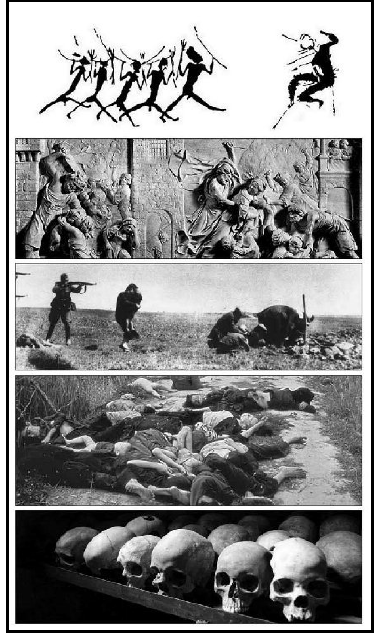
Intergroup violence is so pervasive in human history, we tend to take it for granted. (From top) a prehistoric drawing of archers and victim from a cave in Castellón, Spain; the biblical massacre of the innocents; the shooting of Kiev Jews by Nazis; the My-Lai massacre by American troops in Vietnam; and skulls of the victims of the Rwandan genocide.
Designer babies
There is every reason to believe that the relentless selection process included newborns. Neonates displaying atypical characteristics were ‘soft targets’ and infanticide was unquestionably the simplest, most cost effective application of artificial selection.
This tells us that the most dangerous time in the life of a Cro-Magnon was immediately after birth. That was when the males would inspect each baby and euthanise any infant they considered beyond the norm. This blunt policy of infanticide probably concentrated on conspicuous Neanderthaloid indicators such as the amount of body hair, facial wrinkles, head size and body fat.
For example, while birth is a challenge for most primate species because of the large size of the foetal head compared to the pelvis, the wide birth canal in chimps and gorillas and the small head size of their babies normally allows safe, unassisted delivery. This predicts that Neanderthal females also had wide hips and small-headed babies to make birth easier and safer.
Applying the differentiation hypothesis predicts that selection pressure would be generated for a larger head size in Cro-Magnon neonates. But even if a large head proclaimed to the tribe that a newborn was ‘one of us’, this reassurance came at a price. If the baby’s head was too big, neither mother or infant would survive. […]
Eliminating the competition
The theory that blind senseless violence—that most loathsome of human proclivities—has played a pivotal role in the emergence of modern humans by eradicating vestigial Neanderthaloid remnants from the Cro-Magnon genome, may be disagreeable. However, the model now goes even further. It predicts that as Cro-Magnons colonised Africa and Asia, they inevitably encountered ancestral hominid populations such as Homo floresiensis (below) and Homo erectus. The model proposes that the perceived deviancy of these indigenous people would also trigger them and us teemic responses, that would predispose Cro-Magnons to treat them as if they were Neanderthals, even though they had never seen a real Neanderthal. In other words, the hotchpotch campaign of sexual selection and artificial selection that they applied to one another would now be applied to other species of Homo they came across.
 Once labelled generically as them, indigenous hominid species would be subject to the full force of Cro-Magnon aggression. With inevitable consequences.
Once labelled generically as them, indigenous hominid species would be subject to the full force of Cro-Magnon aggression. With inevitable consequences.
Could this explain what happened to all those pre-existing populations of hominids and early modern humans spread across Asia, Africa and the Americas? The archaeological evidence certainly confirms that, while there were numerous hominid species living from Africa to Asia before the arrival of Cro-Magnons, once the Cro-Magnons arrived, they all disappeared. The first to vanish were two species of Homo erectus—one in China, the other in Indonesia.
Until then, erectus had been probably the most successful hominid species of all, a tenacious hunter-gatherer who had survived for 1.75 million years and colonised half the globe.
For ages, it was believed that Homo erectus—thought to be the first hominid species to leave Africa—became extinct long before modern humans arrived in their areas. But we now know this is not the case. Recent dating of fossilised bones and artefacts reveals one population of erectus held out on the isolated island of Java until as recently as 25,000 years ago. This coincides with the time humans reached Java. After that, Homo erectus disappears from the fossil record.
Their new cognitive capacity enabled Cro-Magnons to build seaworthy vessels and cross the Timor Sea to Australia. The earliest widely-accepted date for their arrival in Australia is around 38,000 years ago, but a recent review of the data suggests occupation as early as 42,000–45,000 years ago.
When Cro-Magnons arrived, there appears to have been at least one other hominid species already living in Australia—in the south of the continent. Known as the Kow Swamp people, they had relatively large and robust bodies and thick skulls indicating they were related to Homo erectus. It’s thought the Kow Swamp people arrived when there was still a land bridge between Australia and Asia.
The Kow Swamp people appear in the fossil record about 20,000 years ago, and then abruptly disappear. Given that Cro-Magnons entered Australia from the north and the isolated Kow Swamp lived in the south, it is conceivable that the two groups did not make contact for thousands of years. NP theory suggests that when they finally did, the humans promptly wiped them out.
Whether humans were also responsible for the extinction of the diminutive Homo floresiensis—the ‘Hobbits’—on the remote island of Flores in Indonesia about 13,000 years ago, is also impossible to confirm. But again, anthropologists Peter Brown, Michael Morwood and their Indonesian colleagues, who discovered and named floresiensis, argue that they were contemporaneous with modern humans on Flores. This makes them the longest-lasting hominid (apart from humans), outlasting the Neanderthals by about 12,000 years. It also highlights Peter Brown’s claim that these resilient species of the genus Homo may have been direct descendants of australopithecus (like ‘Lucy’), one of the earliest African hominids. If so, then these resilient little fellows managed to survive in a unbroken line for a whopping five million years. Until, that is, modern humans arrived on their island. Once humans arrived, floresiensis abruptly disappeared.
This represents only circumstantial evidence of genocide and requires more proof, but some points are unequivocal. Firstly, by 13,000 years ago, of the at least seven—and possibly dozens, or even hundreds—of different subspecies of hominids which had inhabited the world, there remained only one. Secondly, their disappearance occurred only after the arrival of modern humans. Thirdly, because all other species became extinct, everyone living today can trace their ancestry to the original population of Cro-Magnons in the Levant. In effect, this ‘purification’ of the gene line was evolution by genocide. As an instrument of artificial selection, it was systematic, methodical and extremely efficient. Modern humans owe their present homogeneity to the thoroughness of the genocidal eradication of anyone considered too deviant to fit into the Cro-Magnon culture.
____________
N.B. You can read the first 35 pages of Vendramini’s book here.
